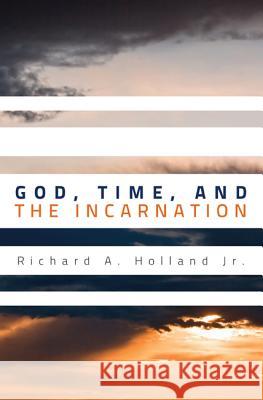God, Time, and the Incarnation » książka
God, Time, and the Incarnation
ISBN-13: 9781610977296 / Angielski / Miękka / 2012 / 206 str.
God, Time, and the Incarnation
ISBN-13: 9781610977296 / Angielski / Miękka / 2012 / 206 str.
(netto: 102,76 VAT: 5%)
Najniższa cena z 30 dni: 106,43
ok. 16-18 dni roboczych.
Darmowa dostawa!
Synopsis: The dominant view among Christian theologians and philosophers is that God is timeless--that he exists outside of time in an atemporal eternity. In God, Time, and the Incarnation, Richard Holland offers a critical evaluation of this traditional view in light of the most central doctrine of Christianity: the Incarnation of Christ. Holland reviews the history of the controversy, highlighting the various theological problems for which atemporal models were offered as a solution. He asserts the central importance of the Incarnation for Christian theology, and evaluates both temporal and atemporal models in light of this doctrine. Finally, he suggests that the traditional atemporal view is not compatible with a robust and orthodox view of the Incarnation, and so it rejects the atemporal view of God's relationship to time, thus providing an argument based on the Incarnation that God experiences temporal sequence in his existence. Endorsements: "The important discussion regarding God and time continues to occupy the attention of philosophers and theologians alike. Dr. Holland's refreshing treatment of this subject makes a major as well as unique contribution to the discussion by considering the subject from the perspective of the Incarnation and Session of Jesus Christ. Superbly written, cogently argued, and biblically situated, this book deserves the attention of all who are engaged or will be engaged in this discussion." --Bruce A. Little Professor of Philosophy MA (Philosophy of Religion) Program Coordinator Director, L. Russ Bush Center for Faith and Culture Southeastern Baptist Theological Seminary "God's relation to time is one of the most fundamental yet most controversial issues in theology. Some theologies that focus almost exclusively on God the Father's relation to time do not provide a fully Trinitarian perspective because they do not adequately account for Jesus' relation to time in the incarnation. Richard Holland's proposal in God, Time, and the Incarnation, which offers an intriguing incarnational alternative to the classical atemporalist view, deserves our thoughtful reflection." --Steve Lemke Provost and Professor of Philosophy and Ethics McFarland Chair of Theology New Orleans Baptist Theological Seminary "In God, Time, and the Incarnation, Richard Holland makes a significant contribution to the debate concerning God's temporal nature. His insight is that a robust understanding of the Incarnation must be the controlling framework within which to develop a view of God's relation to time. The first book-length treatment of how the Incarnation bears on the discussion, Holland's work will be essential reading for any future investigations of God and time." --Garrett J. DeWeese Professor of Philosophy and Philosophical Theology Talbot School of Theology, Biola University Author Biography: Richard A. Holland Jr. is Assistant Professor of Seminary at Liberty Baptist Theological Seminary, and Visiting Instructor of Philosophy at the University of North Carolina School of the Arts.
Synopsis:The dominant view among Christian theologians and philosophers is that God is timeless--that he exists outside of time in an atemporal eternity. In God, Time, and the Incarnation, Richard Holland offers a critical evaluation of this traditional view in light of the most central doctrine of Christianity: the Incarnation of Christ. Holland reviews the history of the controversy, highlighting the various theological problems for which atemporal models were offered as a solution. He asserts the central importance of the Incarnation for Christian theology, and evaluates both temporal and atemporal models in light of this doctrine. Finally, he suggests that the traditional atemporal view is not compatible with a robust and orthodox view of the Incarnation, and so it rejects the atemporal view of Gods relationship to time, thus providing an argument based on the Incarnation that God experiences temporal sequence in his existence.Endorsements:"The important discussion regarding God and time continues to occupy the attention of philosophers and theologians alike. Dr. Hollands refreshing treatment of this subject makes a major as well as unique contribution to the discussion by considering the subject from the perspective of the Incarnation and Session of Jesus Christ. Superbly written, cogently argued, and biblically situated, this book deserves the attention of all who are engaged or will be engaged in this discussion."--Bruce A. LittleProfessor of PhilosophyMA (Philosophy of Religion) Program Coordinator Director, L. Russ Bush Center for Faith and CultureSoutheastern Baptist Theological Seminary"Gods relation to time is one of the most fundamental yet most controversial issues in theology. Some theologies that focus almost exclusively on God the Fathers relation to time do not provide a fully Trinitarian perspective because they do not adequately account for Jesus relation to time in the incarnation. Richard Hollands proposal in God, Time, and the Incarnation, which offers an intriguing incarnational alternative to the classical atemporalist view, deserves our thoughtful reflection."--Steve LemkeProvost and Professor of Philosophy and EthicsMcFarland Chair of Theology New Orleans Baptist Theological Seminary"In God, Time, and the Incarnation, Richard Holland makes a significant contribution to the debate concerning Gods temporal nature. His insight is that a robust understanding of the Incarnation must be the controlling framework within which to develop a view of Gods relation to time. The first book-length treatment of how the Incarnation bears on the discussion, Hollands work will be essential reading for any future investigations of God and time."--Garrett J. DeWeese Professor of Philosophy and Philosophical Theology Talbot School of Theology, Biola UniversityAuthor Biography:Richard A. Holland Jr. is Assistant Professor of Seminary at Liberty Baptist Theological Seminary, and Visiting Instructor of Philosophy at the University of North Carolina School of the Arts.











